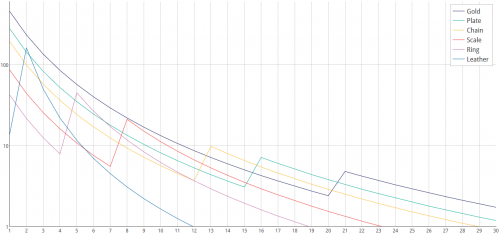Encumbrance rating
For shield encumbrance, see Shields. Not to be confused with encumbrance from inventory weight, an obsolete mechanic.
An encumbrance rating is a penalty applied to body armour. The heavier your armour, the higher the encumbrance rating. The higher the encumbrance, the higher the penalty is to evasion, spellcasting, stealth, and ranged weapons. Encumbrance can be mitigated, but not removed, by strength and Armour skill.
Encumbrance rating is exclusive to body armour. Certain other armours may "encumber" you, but use different mechanics.
- Bardings have a -2 EV penalty. This does not penalize casting, stealth, etc., and cannot be reduced by strength / armour skill.
- Shields also have an encumbrance. But this encumbrance is handled entirely differently. See Shields for more details.
See the Table of Armours for numerical details on all items with encumbrance ratings.
Contents
Base Penalty
Body armour has a "base" penalty of:
Where "S" = scale (an arbitrary multiplier), "armour" = Armour skill and "str" = strength.
This equation can be simplified into the following form:
While this equation is not used directly, it is used to determine most of the other penalties.
Evasion
Encumbrance rating has two effects on EV:
- Encumbrance will directly lower your evasion. This is reduced by armour skill and strength.
- Encumbrance will lower the effect of Dodging skill. This penalty is only reduced by strenght.
EV Penalty
Encumbrance will lower your EV by:
This number is subtracted directly from your EV score.
Dodging Penalty
Encumbrance will also reduce the EV gained by Dodging skill and dexterity.
For Dodging Bonus = (8 + 0.8 × Dodging × Dex) / (20 - size_factor). See Evasion for more detail.
This Dodging Bonus is then multiplied by a modifier.
- If (encumbrance - 3) ≥ strength:
- If (encumbrance - 3) < strength:
(For e = encumbrance)
Spellcasting Penalty
Encumbrance increases "spellFailure", which is not to be confused with your chance of actually failing a spell.
As a reference:
- 1 intelligence = -2 spellFailure
- 1 Spellcasting skill = -3 spellFailure
- 1 (Spell School) skill = -12 spellFailure, divided by the number of schools of a spell
"SpellFailure" is then transformed multiple times to determine your actual chance of failure. See spell success for details.
Stealth Penalty
This penalty is subtracted directly from your stealth score. Not adjusted by strength or armour skill.
Ranged Weapon Penalty
This penalty, in decaAut, is added onto weapon delay to Ranged Weapons (but not Throwing). Divide by 10 to convert to decaAut. A simplified version of this formula can be found in the Ranged Weapons page.
Analysis
On Evasion
Strength generally has a diminishing return on encumbrance. There exists a clear breakpoint, e - 3 > str, where the dodging penalty shifts from 1 equation to another. Therefore, the strength point at (str = e - 2) gives more EV than the points proceeding it. The value decays from there, though the first few strength points after (str = e - 2) tend to be valuable too. Note that it only applies to evasion, not casting or ranged weapons.
This is the basis behind a rule of thumb, where strength should at least be the same number as encumbrance. However, this is not a hard rule. More strength is still likely to have a noticeable impact.
It can be graphed using the second derivative of (armour penalty) + (dodging penalty):
Spreadsheet
See this spreadsheet (and/or make a copy) for an armour penalty calculator: Calculator (outdated as of 0.27)
History
- Ranged weapon penalities were added in 0.29.
- Armour to-hit penalities were removed in 0.28. Specifically, they were:
- Armour no longer slows down unarmed melee attacks, and some of the mathematics have changed between 0.13 and 0.17.
- Encumbrance ratings were introduced in 0.13, replacing the EV penalty system.








